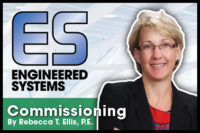Our ability to assemble and document the information we are about to change, as well as documenting how we changed it, is cardinal to our successful transition.
As we enter a new era in which all the rules change, documenting where we are going and where we have been will control our success. We are extremely fortunate that the Web-based movement that is driving the change is also providing the medium to document. Web-based presentation provides us a powerful vehicle to share information anywhere with all stakeholders, but we must effectively plan now to make this happen.
Website As Information Clearinghouse
The creation of a website or the appending to an existing website to house documentation for each major complex is critical. The website must successfully provide a virtual presentation of the building and all its documentation. I believe a new industry is evolving for the traditional documenting, commissioning, and balancing companies. They must seize this opportunity and provide turnkey solutions for building owners.These solutions must include the generation of standalone electronic media with a browser-based front end serving a combination of web pages and formatted files such as portable document format (PDF), jpg, CAD, spreadsheet, and Word document. This presentation greatly reduces the mountain of O&M paper that now exists in most large buildings. Careful planning by the documenter is required as to what information should be included and how information should be best presented.
Existing paper documentation can easily be scanned into PDF files and organized with a browser-based HTML front end for easy retrieval. The mountains of O&M manuals for the average building can be easily accessed with a few mouse clicks. Powerful search capabilities allow us to get the information we need quickly. Understanding what we have allows us to move ahead rapidly when upgrading existing buildings or dealing with new O&M ownership.
But What Should it Contain?
Below is an extract from the2003 ASHRAE Handbook: “Operation and maintenance documentation should be prepared as outlined in ASHRAE Guideline 4. Information should be documented as soon as it becomes available. This supports design and construction activities, systems commissioning, and training of operation and maintenance staff.”A complete O&M documentation package consists of the following documents:
- I. General information.
- A. Building function.
- B. Building description.
- C. Operating standards and logs.
- II. Technical information.
- A. System description.
- B. Operating routines and procedures.
- C. Seasonal start-up and shutdown.
- D. Special procedures.
- E. Basic troubleshooting.
Proper O&M procedures are important factors in providing good IAQ and ensuring that life safety systems operate as designed.
The traditional paper O&M structures should be maintained but should also be available on a website. The system description and operating routines and procedures outlined for the operating manual are areas where our industry must do a better job of documentation. The sequence of operation must include a description of how the automation system interfaces with the building systems.
In the past, much of this documentation was in the control language of the various vendors’ systems. The typical “if-then” logic of most DDC systems provided rudimentary documentation. Control strategies now often cross over several vendors’ systems, and XML inter-relationships are becoming more common, hence better Web-based presentation is required to properly explain our complex interweaving of logic. In the future, more and more control will be Web-based and will require new methods of documentation.
Interactive Web-based presentations will allow complex building systems to be depicted and described using interactive multimedia Web presentation. This new approach, when shared anywhere with all stakeholders, will allow a greater understanding and will provide a much needed training element to the building operating sequence. Generation of the first few documentation systems will be tedious and painful, but as patterns emerge the inherent ability of Web-based to replicate will take over and total documentation time will be reduced.
This is yet another opportunity to develop industry standards and examples. If you have examples you would like to share, please contact me and I will provide readers with links to your URLs.


